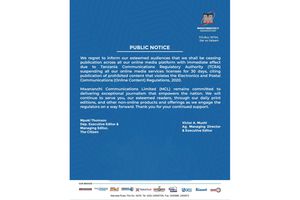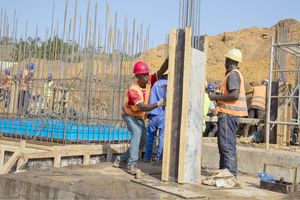Samia to address traders’ issues with newly formed commission

Some of the members of Presidential Commission on Tax Reforms. From left: Florence Luoga. Mwanaidi Sinare Maajar and Aboubakar Mohamed Aboubakar. PHOTO | COURTESY
What you need to know:
- The commission, led by former Chief Secretary Ambassador Ombeni Sefue, will review and advise on tax matters and its members include prominent figures from the banking auditing, and business sectors
Dar es Salaam. President Samia Suluhu Hassan’s decision to form a Presidential Commission on Tax Reforms is a welcome development, stakeholders say, urging the team to ensure it consults widely for it to yield intended results.
On Wednesday, President Hassan formed the committee – chaired by former Chief Secretary, Ambassador Ombeni Sefue - and tasked it with reviewing and advising on tax matters.
A statement released by Chief Secretary Dr Moses Kusiluka, named members of the commission including former Governor of the Bank of Tanzania (BoT) Prof Florens Luoga; former Controller and Auditor General (CAG) Prof Mussa Assad; retired Secretary General and Ambassador Maimuna Tarishi; Senior Lecturer at Zanzibar University Aboubakar Mohamed Aboubakar; retired Ambassador and Legal Advisor Ambassador Mwanaidi Sinare Maajar; former senior PricewaterhouseCoopers (PWC) Tanzania chief executive officer Leonard Mususa; tax expert and former Head of the Tax Advisory Department at PwC David Tarimo and Commissioner of Foreign Finance at the Ministry of Finance and former Commissioner General of the Tanzania Revenue Authority (TRA) Rished Bade.
The formation of the committee follows recommendations made during the 15th meeting of the Tanzania National Business Council (TNBC) which President Hassan chaired in Dar es Salaam last week.
It also follows recent complaints among members of the business community and some diplomats regarding what they seem to be an ‘exploitative’ tax regime in Tanzania.
Recently, traders closed their shops in Dar es Salaam and in other major urban centres, demanding the government put all taxes within a single collection basket and that the fines imposed on them whenever they go contrary to business norms be reduced to the level of traffic offences.
It is against such a background that analysts and traders are of the view that the commission should involve all groups and explore the possibility of consolidating taxes into a single payment system.
This, they say, will increase compliance and widen the tax base.
Speaking to The Citizen yesterday, a finance and tax expert from Mzumbe University, Prof Haruni Mapesa, said most complaints on taxes were based on a lack of evidence regarding how the tax was utilized and its impact on easing business operations.
He said that low compliance was partly due to the number of taxes and levies traders face.
As such, he said, the commission should develop a system where business people could pay all their taxes in one basket.
“Traders are ready to pay a large amount of tax at once which would reduce compliance costs in councils, TRA, and others. The committee should explore the possibility of consolidating all taxes into one basket,” he said.
The commission, he said, should engage widely because laws related to financial issues often do not involve all relevant groups.
“As a result, their implementation frequently leads to complaints from businesspeople.
To address this, it is important to ensure that all groups are visibly involved in the process,” he said.
“We thank President Samia for establishing the commission composed of experienced individuals….We hope it will provide a permanent solution,” he said.
A partner at the Auditax International, Dr Straton Makundi said the formation of the commission was long overdue.
Like Prof Mapesa, Dr Makundi said the commission needs to engage extensively, involving stakeholders in all sectors of the economy to ensure their views are captured and that it should also come up with practical recommendations that will be implemented by the government.
“The most important matters are the terms of reference for the commission which should aim to address the challenges of our tax system from tax policy, tax laws to tax administration,” said Mr Makundi.
On policy, he said, the commission could look at the right mix of taxes and appropriate tax rates to stimulate investment and the growth of the economy.
Tanzania, he said, has high tax rates especially payroll taxes and VAT which increase the costs of doing business and reduce competitiveness.
“For instance, the VAT rate in the tourism sector is higher compared to other tourist destinations in Africa.
There is also a challenge of low tax to GDP ratio as compared to comparator countries (about 12 percent).
This reduces the ability of the Government to provide public services and infrastructure development,” he said, noting that widening the tax base to also include addressing the challenges of taxing the informal economy was a big concern.
Dr Makundi said there were also challenges on the drafting of some provisions of tax laws.
“Examples include the use of agency notices; payment of VAT on issuing invoices/certificate before receiving payment which bring challenges in some sectors such as construction; weaknesses in change in control rules which limit the ability to raise finance in some sectors such as mining thus discouraging investment,” he said.
Other issues that need to come out clearly include addressing tax challenges of banks and financial institutions, including relief for bad debts, treatment of interest in suspense; applicability of thin capitalisation and Controlled Foreign Cooperation rules in the income tax Act.
On tax administration, said Dr Makundi, there was a need to thoroughly address the cause of disputes between TRA and taxpayers (for instance traders), address the issues of voluntary tax compliance, the use of technology in tax administration, come up with effective alternative tax disputes resolution mechanisms.
Addressing cultural and ethical issues is also key etc.
An economic lecturer from the University of Dodoma, Dr Lutengano Mwinuka, exuded confidence that the experience of the people in the commission would make the job easier.
However, he emphasized the need for a balance between the government’s revenue targets and the desire to create a conducive environment for businesses to thrive.
“We would like the committee to provide a thorough analysis with strong arguments so that the government can make necessary adjustments overall,
I am confident that the committee will address challenging areas and suggest necessary actions,” he said.
On the other hand, traders’ national chairman, Mr Khamis Livembe, told The Citizen said that the committee should be patriotic and offer permanent solutions to the challenges facing the traders.
“We should not form a new committee every day; this one has experienced members, and we are confident they will address our tax-related challenges,” he said.
Mr Livembe added that traders applauded President Hassan for fulfilling her promise to form a presidential committee to investigate the tax system.
“We have already presented our grievances about the current electronic tax collection system, which is not beneficial for traders.
We want our members to remain calm and allow the committee to work on their behalf.” he said.




